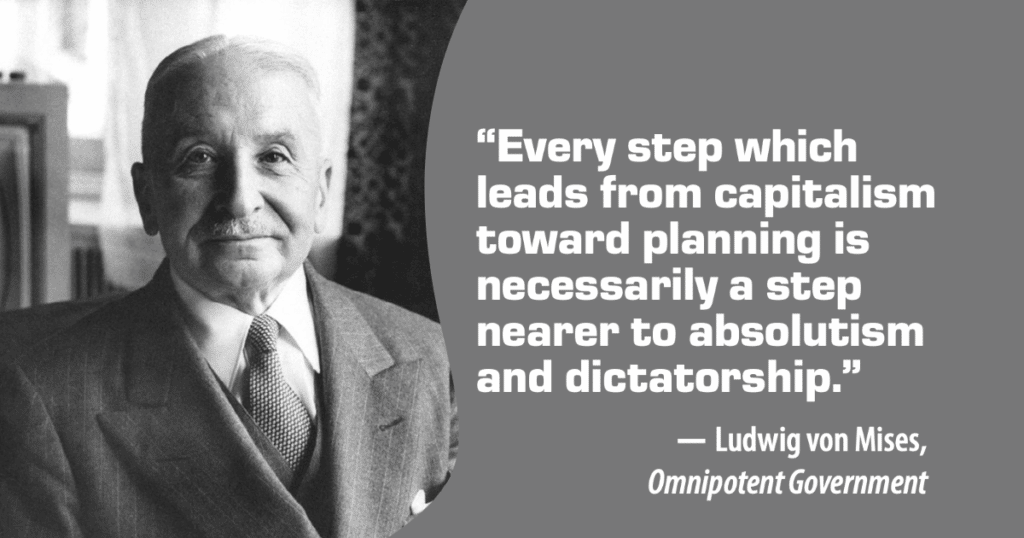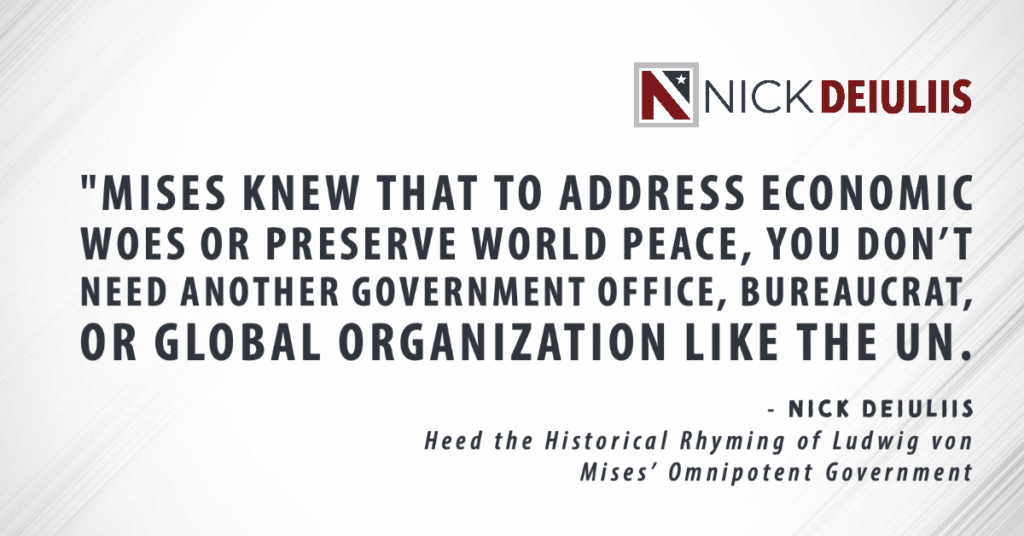Ludwig von Mises was a shining light in the Austrian school of economics and for libertarianism. Despite the obsession Keynesians and socialists have with tarnishing his legacy, Mises sounded the alarm about statism louder and clearer than anyone.
One of his great works was Omnipotent Government, which Mises published toward the end of World War II. Although much of the book focuses on analyzing fascism and socialism, many of the book’s insights from the mid-1940s are quite pertinent today.
Capitalism versus Totalitarianism
There are two big, opposite ideological trends for mankind to choose from.
The first is capitalism, which embraces freedom, rights of man, self-determination, and technology. Under capitalism the arts and science thrive. Excellence and meritocracy are celebrated.
The second is totalitarianism, where the state is omnipotent. Power is vested in government because government promises to make paradise. Individual happiness becomes the duty of government, creating a nanny-state. The final goal is not a national government but a universal government.
Mises understood human nature comes with a certain level of intolerance of criticism of an individual’s social and economic beliefs. Often the intolerance is accompanied with labeling the critics as enemies of the nation, race, or group.
Capitalism has a clearly superior record compared to socialism and communism. Thus, the supporters of the latter take pains to slander the former. Mises set the facts straight when it comes to capitalism’s superiority over socialism and communism.
Yes, capitalists and inventors get rich, but they do so while everyone else becomes better off with their inventions and products. Capitalism is far from perfect, but in the long run raises quality of life for all, including the poor. Despite government continually attempting to stifle it. True liberals oppose state impediments to a free economy and freedom of economic activity.
Such benefits are not found with the bureaucrat or state control of the economy. Communism did not bring technological innovation to society and only copied the innovations of the capitalists. Only a bureaucrat can think that adding more bureaucrats, regulations, or impediments can be positive and beneficial. And the justifications will be in the name of progress and freedom, with both being the first casualties.
The concept of pervasive, omnipotent government did not start with the commoners and bubble up to the elite. Quite the contrary. Statism was conceptualized by the elite. All socialist thought was hatched by the 1%.
Totalitarians, whether socialist, religious, fascist, or communist, believe they are smarter than the citizens. Extreme right meets extreme left, with no tolerance of dissent. Hitler got his orders from above; the religious leader is infallible; President Xi enjoys demi-god status; and Putin is now leader for life instead of elected president for term. The German socialist Ferdinand Lassalle claimed, “the state is God,” which was eventually adopted as a slogan by the Nazis.
The Big Middle
But between capitalism and totalitarianism sits a wide spectrum of free market and government intervention mix. Etatism¹ is an economic system where the state owns and runs many things although some limited capitalism still exists. Economic interventionism is the hallmark of etatism.
There is interference by restriction, where the state diverts production from channels demanded by the market, consumers, and technology into what the state desires. Doing so makes people poorer, prevents individuals from achieving, erodes wealth, and wastefully expends funds. Government ends up taxing losers and subsidizing winners, with inefficient bureaucracy in the middle of it all.
Interference by price controls is the second method of government interventionism, which sets values and prices differently than what the market sets them at. Where market pricing sets equilibrium of supply and demand, government price controls create scarcity and rationing.
Mises found it ironic that the free market nations fighting Germany in World War II, the UK and US, were adopting a more etatist approach with a command economy. In these once capitalistic economies, taxation was transformed into confiscation, free thinkers were taught to be thought followers, and individual freedom to act was supplanted with government now having the initiative.
In many ways, the creeping etatism of the Allied nations set the stage for World War II by creating international economic strains. The UK wanted to protect its industry from France. Belgians fought Dutch imports. Subsidies for exports grew everywhere. Protectionist tariffs spread virally. Each nation was waging an economic war against other nations. Everyone wanted free trade for everyone else and protectionist policies for their own nation. Pain and tensions ratcheted up to the breaking point—and it feels like the same is happening today.
Mises knew that to address economic woes or preserve world peace, you don’t need another government office, bureaucrat, or global organization like the UN.
What is needed is stopping and rescinding domestic economic policies that substitute government for the private actor.
Unfortunately, we continue to drift to more etatism, with the growth of the administrative state to address inequality and the adoption of international accords like Paris to ‘combat’ climate change.
The evil genius of the transformation of western nations from free market to etatist is that when troubling symptoms of state control hit, such as inflation, unemployment, and economic inequality, people become convinced it is the fault of capitalism and not the fault of illiberal policies of government intervention. Academia and the bureaucratic state ridicule economic liberalism, the social sciences vilify the free market, university students are taught to admire socialists, and the entertainment industry has been promoting etatism in plays, writings, songs, and movies since the days of George Bernard Shaw.
The closer a nation orbits toward etatism and away from capitalism, the graver the danger. Mises said it best: “A state whose chiefs recognize but one rule, to do whatever at the moment seems expedient in their eyes, is a state without law. It does not make any difference whether or not these tyrants are benevolent.”
Although the state may end up doing and running lots of things, the essence of state action is always coercion and compulsion. When done surgically and tactically, it works for the individual. But it should never be the ultimate. It is simply an instrument for the true ultimate: the individual.
The Weimer Republic and Today
Unfortunately, state economic intervention is popular as ever, including in the US. FDR would be shocked to see how since the Great Depression, America blew past his New Deal incremental interventionist shifts and now sits closer than ever to socialism. How did we get here? Consider parallels to Germany just after World War I.
During the failed German Weimer Republic, businesses were accused of profiteering, inflation ruined the middle class, incompetent government looked to price controls, and a socialist approach was taken to monetary policy. The media, economists, and politicians of the time ignored the danger of excessive monetary policy leading to commodity inflation. Capitalism was vilified as exploitive, unfair, warmongering, and benefitting only the 1%.
The answer was to increasingly manage business by government and the bureaucrat. Easy money, price controls, wage floors, export subsidy, and import tariffs blossomed. All for the public good and to help the little guy.
Sound familiar?
Rise of the Nazis and Today
American popular support for socialism, communism, and state intervention have never been higher. We did not arrive at this point by accident, but under a methodical campaign waged by the elite over decades.
Much of the campaign’s playbook copied that of the Nazis in their rise to power before World War II. Nazism and German nationalism were first resisted by big business and the middle class. But these groups had no consistent ideology and were overcome by the academic focus of Nazism and nationalism. Youth came out of university indoctrinated to the cause.
The nationalists assumed key government posts. The economy became more etatist, which made businesses subserviate to the government and the bureaucrat’s nationalist ideology. The government ended up forcing business to bow to its views and fund those views. Business had no way to influence public opinion once the tipping point was reached. The intellectuals beat the businessmen.
Substitute leftist/socialist for Nazi/nationalist, 2010-2020s for 1920-1930s, and America for Germany. Concerned?
Conclusion
The state has been an endless source of mischief and disaster through history.
Mises observed that “there is no more dangerous menace to civilization than a government of incompetent, corrupt, or vile men.” The minority in a society stands to lose and suffer the most as a state moves from capitalist end toward the etatist/totalitarian side of the spectrum.
That’s why I’ve always found libertarianism attractive.
Classic liberals and libertarians are not anarchists and do not desire to abolish the state. We want government to recognize the supremacy of the individual and to protect private property. If you have private property, then you have individual rights, and vice versa.
To avoid war, eliminate its causes, which are all too often nationalism and lack of free markets. Make government small and focused on preserving life, health, and property. And safeguarding the free market.
Yet Mises’ writings convinced me that etatism is the natural tendency of bureaucrats and governments. Only liberalism and capitalism prevail when pressed and forced by citizens. Market interventionism is a slippery slope that can quickly slide us toward totalitarianism.
Mark Twain noted that history does not repeat itself, but it often rhymes. Let’s hope the American experience in the coming years does not rhyme with Germany’s in the first half of the 20th century.





